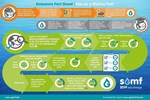The Society for Gas as a Marine Fuel (SGMF) has released a video explaining why Liquified Natural Gas (LNG) is currently the only viable solution available that can cut emissions from deep-sea shipping as newer, cleaner options are developed.
The video describes how LNG can provide a clear pathway to fuels that will enable the industry to meet the International Maritime Organization’s target to reduce greenhouse gas (GHG) emissions by at least 50% by 2050.
The disruption being caused by the COVID19 pandemic highlights the crucial role of shipping in enabling global trade, with governments working to safeguard supply chains for essential goods. Given this fundamental role in trade, reducing emissions from shipping is critical. Shipping currently represents around 3% of total global emissions. That contribution could change significantly as other sectors switch to renewables if the shipping fuel mix remains unchanged.
Mark Bell, General Manager for SGMF said; “We produced this video as there is still a lot of debate around the use of LNG and its role in achieving the 2050 targets, and eventual zero-carbon emissions in shipping. We are not here to tell anyone what to do but we are here to lay out the facts regarding the use of LNG. Be quite clear that the fuel choice is only part of the solution but without its widespread use or the delay of that use, 2050 targets will not be met. Net zero carbon fuels are not yet available for shipping and could be some way off, LNG is a both a pathway to those fuels whilst also providing benefits now”.
“With a changeover to LNG today we can reduce GHG emissions by up to 21% compared with current oil-based marine fuels over the entire lifecycle from well to wake*. We want to help the industry understand that it is more attainable then people may believe to have a significant and immediate impact on emissions.”
View the video here.
Courtesy of WAKE Media.


